Congratulations to Ashley Inman, President of the Model UN Club at Gulf Coast High School, for winning our Research Binder Contest! Ashley submitted the best pictures and descriptions of her binder, and for that, she will receive a copy of the Best Delegate Guide on How to Win Awards in Model UN!
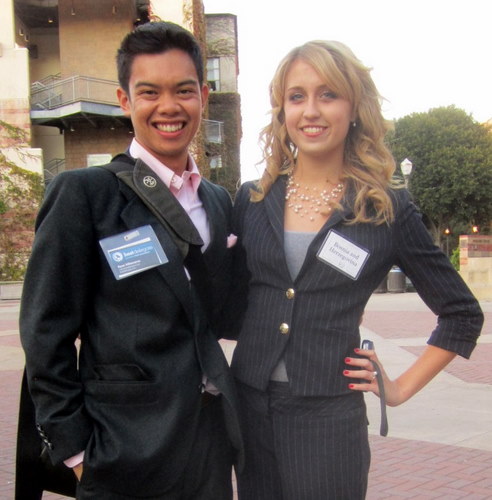
Research Binder Contest Winner Ashley Inman from Gulf Coast High School (right) and me (left) at UCLA BruinMUN
Below is her winning submission, which I hope Best Delegate readers will find helpful in putting together their own research binders.
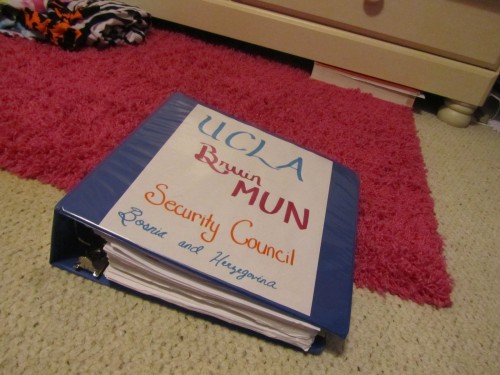
Ashley's Winning Research Binder! Her research helped her win Best Delegate in the Security Council at UCLA BruinMUN
In addition to the 15 things that Best Delegate recommends, I like to organize my binder in a specific way:
I. Conference Information
- Conference Information
- Awards Policy
- Parliamentary Procedure
- Code of Conduct/Other relevant conference and club information
II. Country Information
- CIA Factbook
- Wikipedia
- Voting Record
- Position Papers
III. Committee Information
- Section of UN Charter on specific committee
- List of powers/abilities of committee
III. Topic I
A. Research/Issue
- Background guides
- Past Resolutions, Conventions, and other relevant international action
- Trend/Analysis Reports
- News Articles
- Reports of the Secretary-General
(I like to put these in chronological order, starting from the oldest research to newest, in order to identify trends over time!)
B. Solutions
- “Mind Map”
- Actual proposed action from your country (based upon recent speeches)
- National or regional frameworks that have been successfully implemented in your country for similar issues, that can be applied elsewhere
- Academic Papers, Think Tanks, etc.
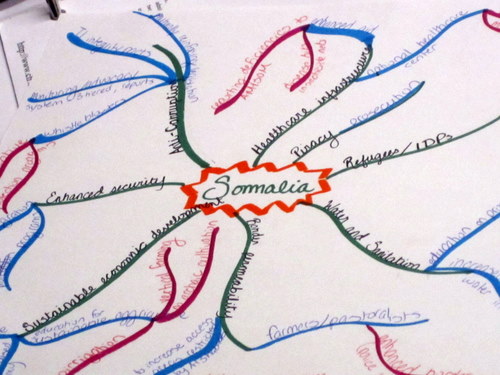
A "mind map" that frames the topic, breaking it down into sub-issues and possible solutions
At my first conference this year, I represented the Russian Federation in SpecPol at Georgia Tech’s GTMUN. The topic was preemptive strike in modern warfare. For a topic like this, in which little action has been taken by the international community to address such a topic, I had to focus on other sources for information (especially when my chair didn’t put up background guides), so my research binder was ever-more important.
Especially when role-playing a country with such a specific militaristic policy, my research had to be thorough–I ended up finding numerous helpful sources, including academic papers on asserting the legality of preemptive strikes and assessment reports by organizations such as the Institute for National Strategic Studies.
I primarily relied on strategic research and assessment reports by various military personnel. One such report gave a comparative analysis of countries’ policies regarding preemptive strikes, and through these and various news articles/historical background, I was able to determine Russia’s stance on preemption, establish proposed action amenable to Russia and most other large militaristic countries on what the definition of preemption is, when it can be used, to what extent, etc.
My paper was the only one that passed in the committee out of 8. As more conferences begin assigning topics that have little previous action to assuage them, relying on other means of research besides the typical previous UN resolutions and conventions grows more important.
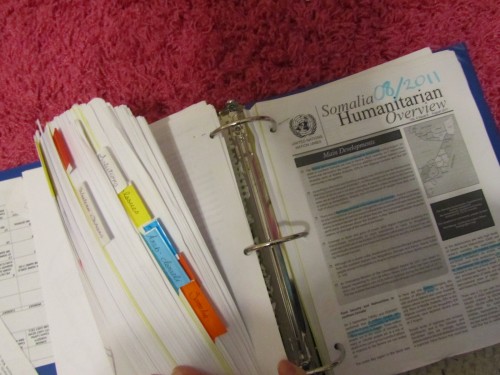
A well-organized research binder
It’s also helpful, in my opinion, to have a sheet of your narrowed-down proposed action to reference in committee; that way, you don’t have to sift through your binder to reference the most pertinent information all the time.
On that note, I like to carry around a thin leather binder with a legal pad inside (I prefer to use a pink legal pad, as Best Delegate pointed out in their UCLA BruinMUN recap, haha!) because it’s easy to move around in committee and you can reference the most important facts and figures you’ve researched with ease.
I like to keep a separate binder for each conference, simply because if you repeat a topic you can go back to a previous binder and gather some of the information from there and still keep everything organized.
And, of course…one must be sure to pass around a paper for everyone to write his or her Facebook information on, to keep in touch after the conference 🙂
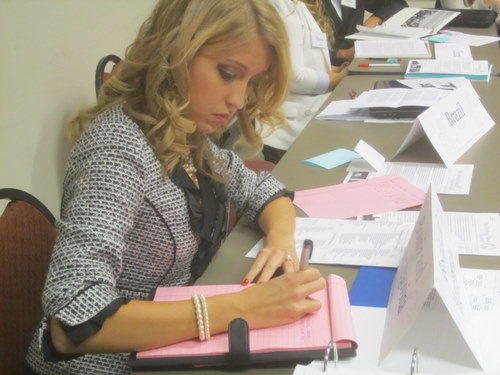
Ashley recommends keeping a legal pad with your research binder
How my research binder has helped me:
The value of a research binder for a conference is often underestimated, but in reality, it cannot be underscored enough — the research process is crucial to Model United Nations!
In my opinion, MUN is first and foremost a learning experience, a vehicle to garner knowledge and widen perspective and understanding of the international community, its cultures, its inhabitants, and its political, social, and economic relationships. Learning international relations, ranging from humanitarian topics such as world health to security concerns like child soldiers and conflict diamonds; representing countries from Afghanistan to Zimbabwe — that is what Model U.N. is primarily about.
The team I debate with, Gulf Coast High School, places particular emphasis on research and maintaining well-organized, thorough binders. To us, learning comes from first, the “competition” second. When I return to school from a conference, I feel as though I’ve learned more in that weekend than school could have taught me in a month (and that’s coming from someone with six AP’s).
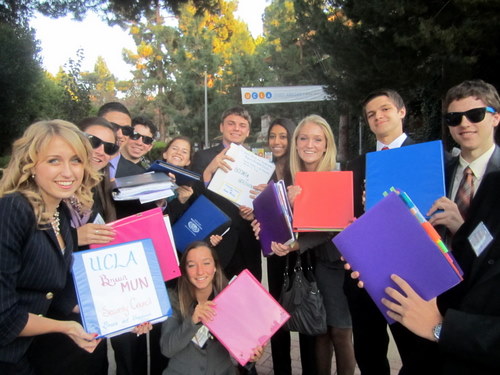
Gulf Coast High School holds up its research binders at UCLA BruinMUN, where it won Best Small Delegation
However, on that note, Model U.N. is a form a debate, and naturally, debate can become highly competitive. Research binders facilitate this purpose as well: more often than not, the delegates that are the most well-versed in the topic are the ones who perform to the highest standards in a committee.
When one deeply understands his or her topic, it’s much easier to speak about it with confidence; by that logic, more research = more knowledge = better performance in committee. Moreover, better research helps in the writing of position papers, which are growing increasingly important as many large, dynamic, and highly-competitive conferences factor the quality of a position paper into individual awards.
I know organizing my research binder has helped foster my growth not only as a delegate, but a student and a global citizen in general; I learned to keep organized information, the proper research process, and it certainly helped in committee when I needed to reference a document or pertinent data.
Model U.N. was designed so students could simulate an international organization in order to become more cognizant of the world around them — research is an integral part of this process. To gain such understanding, one must do his or her part, so to speak, and if you ask me, there’s no better way to do it than with a binder.

